A challenge for each one of us
To view previous posts in this series, see here.
Thursday of the Third Week in Lent
Are you listening to the voice of the Lord?
Is your heart hard? Jer 7:23-28
Are you speaking about Jesus to others?
Does jealousy cause you to judge others?
Is your house divided?
Do you recognize the Kingdom of God?
Are you with Jesus or are you scattering? Lk 11:14-23
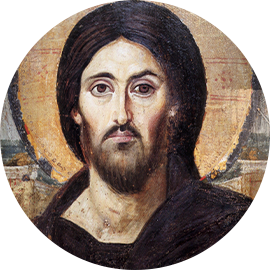
Questions from a letter to the Corinthians by St. Clement
- Do you cling to the saints?
- Why are there divisions among you?
- Do you not all have the same Spirit?
- Why do you tear apart Christ’s body?
- Have you forgotten that you are members of one body?
- Are you zealous for the common good?
(Office of Readings, Second Reading for Monday of the 14th week of Ordinary Time)
Image Credit: Icon of Jesus Christ Pantocrator, Encaustic on wood, St. Catherine’s Monastery Sinai, 6th century. PD
The Solemnity of the Annunciation
Happy feast of the Annunciation!
Once again, we’ll take a break from questions.
Instead here is a beautiful reading from Saint Leo for your meditation.
From a letter by St Leo the Great
Lowliness is assured by majesty, weakness by power, mortality by eternity. To pay the debt of our sinful state, a nature that was incapable of suffering was joined to one that could suffer. Thus, in keeping with the healing that we needed, one and the same mediator between God and men, the man Jesus Christ, was able to die in one nature, and unable to die in the other.
He who is true God was therefore born in the complete and perfect nature of a true man, whole in his own nature, whole in ours. By our nature we mean what the Creator had fashioned in us from the beginning, and took to himself in order to restore it.
For in the Savior there was no trace of what the deceiver introduced and man, being misled, allowed to enter. It does not follow that because he submitted to sharing in our human weakness he therefore shared in our sins.
He took the nature of a servant without stain of sin, enlarging our humanity without diminishing his divinity. He emptied himself; though invisible he made himself visible, though Creator and Lord of all things he chose to be one of us mortal men. Yet this was the condescension of compassion, not the loss of omnipotence. So he who in the nature of God had created man, became in the nature of a servant, man himself.
Thus the Son of God enters this lowly world. He comes down from the throne of heaven, yet does not separate himself from the Father’s glory. He is born in a new condition, by a new birth.
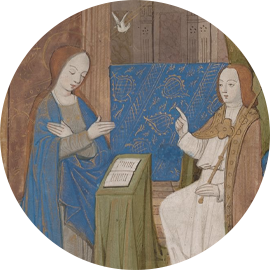
He was born in a new condition, for, invisible in his own nature, he became visible in ours. Beyond our grasp, he chose to come within our grasp. Existing before time began, he began to exist at a moment in time. Lord of the universe, he hid his infinite glory and took the nature of a servant. Incapable of suffering as God, he did not refuse to be a man, capable of suffering. Immortal, he chose to be subject to the laws of death.
He who is true God is also true man. There is no falsehood in this unity as long as the lowliness of man and the preeminence of God coexist in mutual relationship.
As God does not change by his condescension, so man is not swallowed up by being exalted. Each nature exercises its own activity, in communion with the other. The Word does what is proper to the Word, the flesh fulfills what is proper to the flesh.
One nature is resplendent with miracles, the other falls victim to injuries. As the Word does not lose equality with the Father’s glory, so the flesh does not leave behind the nature of our race.
One and the same person — this must be said over and over again — is truly the Son of God and truly the son of man. He is God in virtue of the fact that in the beginning was the Word, and the Word was with God, and the Word was God. He is man in virtue of the fact that the Word was made flesh, and dwelt among us.
Receive, O Virgin Mary, the word which the Lord has made known to you by the message of the angel: You will conceive and give birth to a son, both God and man, — and you will be called blessed among women.
A virgin, you will indeed bear a son; ever chaste and holy, you will be the mother of our Savior.— And you will be called blessed among women.
Image Credit: Book of Hours, Use of Rouen, Philadelphia, Free Library of Philadelphia, Lewis E 126, fols. 14v–15r (miniatures showing the Procès de Paradis or Parliament of Heaven and the Annunciation)
Saturday of the Third Week of Lent
Are you striving to know the Lord?
Is your piety like a morning cloud?
Do you practice the love that God desires?
Do you have knowledge of God? Hos 6:1-6
How do you pray?
Are you certain of your own righteousness?
Do you look down on others?
Do you realize that you need mercy? Lk 18:9-14
Questions from a sermon by St. Gregory of Nazianzen
- Are you merciful?
- Are you considerate to the needy and the poor?
- Are you generous?
- Do you delay in doing good deeds?
- Are your good deeds done with an eager heart?
- Do you grumble or hesitate?
- Do you want light and healing?
(Office of Readings, Second Reading for Saturday of the Third Week of Lent)
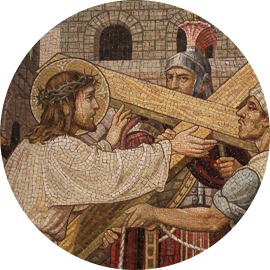
Image Credit: Photo of a Mosaic station from Covington Cathedral by Fr. Lawrence, OP
CC BY-NC-ND 2.0/Lawrence OP
Fourth Sunday of Lent
Are you striving to enter heaven? Jos 5:9a, 10-12
Are you a new creation?
Are you an ambassador for Christ?
Are you reconciled to God? 2 Cor 5:17-21
Do you draw near to listen to Jesus?
Do you complain about the other people who are drawing near?
Do you try to have your inheritance now?
Do you squander what God has given you?
Are you sorry for your sins?
Are you angry because God is merciful to others?
Do you rejoice in the salvation of sinners? Lk 15:1-3, 11-32
Questions from a treatise on John by St. Augustine
- Are you walking in darkness?
- Are you following in the footsteps of Jesus?
- What is chaining you?
- Do you ask Jesus to show you the way?
(From Office of Readings, Second Reading for the Fourth Sunday of Lent.)
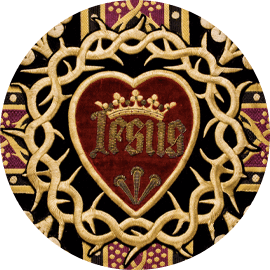
Image Credit: Photo of a chasuble in St Dominic’s Priory, Newcastle by Fr. Lawrence, OP
CC BY-NC-ND 2.0/Lawrence OP
Monday of the Fourth Week of Lent
Do you want rejoicing and happiness? Is 65:17-21
Do you honor Jesus by listening to him?
Do you welcome him?
Do you need to see signs and wonders? Jn 4:43-54
Questions from a sermon by St. Caesarius of Arles
- Are you willing to give mercy?
- Do ask God for something that you refuse to give?
- Do you recognize God in those who are cold and hungry?
- What kind of a person are you?
- When God begs do you refuse to give?
- What do you pray for when you come to church?
- Do you pray for mercy?
(From Office of Readings, Second Reading for the Monday of the Seventeenth Week of Ordinary Time)
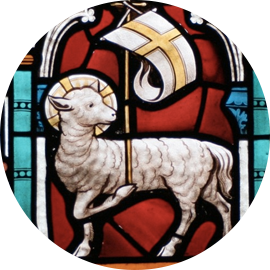
Image Credit: Stained glass window from St Michael’s Sittingbourne, Kent from PxHere
Tuesday of the Fourth Week of Lent
What does your baptism mean to you? Ez 47:1-9, 12
Do you want to be well?
Do you obey the commands of Jesus? Jn 5:1-16
Questions from a sermon by Saint Leo the Great
- Do others realize that you are a disciple of Jesus?
- Do they know this because of your love?
- Have you made a true judgment about your attitudes of mind and heart?
- How great is your generosity in doing good?
- Does your charity have limits?
- Are you full of joy?
(From Office of Readings, Second Reading for the Tuesday of the Fourth Week of Lent.)
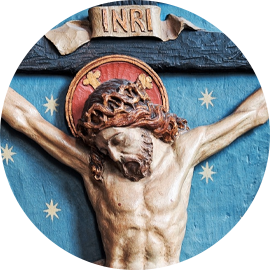
Image Credit: Photo by aitoff/pixabay
Wednesday of the Fourth Week of Lent
Do you help those in prison and those in darkness?
Do you show mercy to the afflicted? Is 49:8-15
How do you honor the Son?
What does it mean to believe in God?
Have you done good deeds? Jn 5:17-30
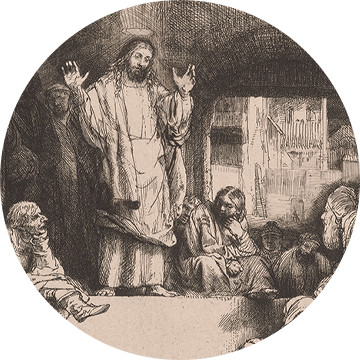
Questions from a letter by St. Maximus the Confessor
- Do you come back to God with true repentance?
- Do you imitate him by your kindness and genuine love?
- Do you forgive?
- Do you behave to others as you want them to behave towards you?
(Office of Readings, Second Reading for Wednesday of the Third Week of Lent)
Image Credit: Christ Preaching, ca. 1657, Rembrandt Harmenszoon van Rijn, The Morgen/PD
Thursday of the Fourth Week in Lent
Have you turned away from the way of the Lord?
Who are you worshiping?
Do you intercede for sinners? Ex 32:7-14
Do you know the Father?
Does his word remain in you?
Do you want to come to Jesus to have life? Jn 5:31-47

Questions from a sermon by St. Leo the Great
- Do you recognize Jesus in our humanity?
- Are you preoccupied with the business of this world?
- Are you striving with all your heart to be like Jesus?
(Office of Readings, Second Reading for Thursday of the Fourth Week of Lent)
Image Credit: Icon of Jesus Christ Pantocrator, Encaustic on wood, St. Catherine’s Monastery Sinai, 6th century. PD
Friday of the Fourth Week of Lent
Are you able to take correction?
Where are your thoughts? Wis 2:1a, 12-22
Do you rely on your own understanding?
Do you truly know Jesus? Jn 7:1-2, 10, 25-30
Questions from an Easter letter by St. Athanasius
- Do you thirst for God?
- Do you meditate on the Scriptures day and night?
- Do you let the Resurrection guide you through the trials of life?
- Do you receive the joy of salvation?
- Are you united to everyone in spirit?
(Office of Readings, Second Reading for Friday of the Fourth Week of Lent)
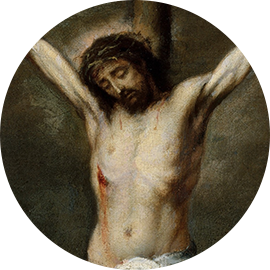
Image Credit: The Crucifixion, ca. 1675 by Bartolomé Estebán Murillo. PD/The Met
Saturday of the Fourth
Week of Lent
Are you destroying the tree that God has planted? Jer 11:18-20
Are you divided from others? Jn 7:40-53

Image Credit: Photo of a Mosaic station from Covington Cathedral by Fr. Lawrence, OP
CC BY-NC-ND 2.0/Lawrence OP
Questions from a sermon on charity by St. Basil the Great
- Are you bearing fruit?
- Do you remember that God will reward for your good deed to the poor?
- Are you using the things of this world correctly?
- Do you only think of your present enjoyment?
- Do you give generously?
- Are you rich in faith, hope and love?
(Office of Readings, Second Reading for Tuesday of the 17th week of Ordinary Time)
Image Credit: Photo of a Mosaic station from Covington Cathedral by Fr. Lawrence, OP
CC BY-NC-ND 2.0/Lawrence OP
Fifth Sunday of Lent
Do you see the new thing that God is doing?
Do you announce the praise of God? Is 43:16-21
Do you consider everything except knowledge of God as a loss?
What rubbish do you have in your heart?
Are you straining forward to your goal?
Do you know what your prize is? Phil 3:8-14
Do you point out the sins of others?
Do you recognize your own sinfulness?
Do you condemn? Jn 8:1-11
Questions from an Easter letter by St. Athanasius
- Do you practice contemplation in your heart?
- Do you worship with gladness?
- Is Jesus your path and your guide?
- Do you only have words and not deeds?
(From Office of Readings, Second Reading for the Fifth Sunday of Lent.)

Image Credit: Photo of a chasuble in St Dominic’s Priory, Newcastle by Fr. Lawrence, OP
CC BY-NC-ND 2.0/Lawrence OP
Monday of the Fifth
Week of Lent
Do you speak falsely?
Do you stand up for the innocent? Dn 13:1-9, 15-17, 19-30, 33-62
Are you walking in darkness?
Do you judge by appearances? Jn 8:12-20
Questions from a homily on Matthew by St. John Chrysostom
- Are you a sheep or a wolf?
- Are you a part of Christ’s flock that he may feed you?
- Is anything more important to you than your faith?
- Do you seek revenge?
- Do you glory in your weakness?
- Do you answer violent attacks with moderation?
(From Office of Readings, Second Reading for the Tuesday of the 34th Week of Ordinary Time)

Image Credit: Stained glass window from St Michael’s Sittingbourne, Kent from PxHere
Tuesday of the Fifth Week of Lent
Do you complain against God?
Do you ask his forgiveness for your lack of trust? Nm 21:4-9
Why are you looking for Jesus?
Do you belong to this world?
Do you believe that Jesus is God?
Do you only do what the Father has taught you? Jn 8:21-30
Questions from the letter to the Hebrews
- Do you hear God’s voice?
- Is your heart hard?
- Do you want to enter into God’s rest?
- What type of spirit do you have?
- Do you encourage your fellow Christians?
- Do you have confidence in Christ?
(From Office of Readings, First Reading for Tuesday of the Fifth Week of Lent.)

Image Credit: Photo by aitoff/pixabay
Wednesday of the
Fifth Week of Lent
Who do you worship?
Are you faithful to God even in difficult situations? Dn 3:14-20, 91-92, 95
Do you remain in God’s word?
Do you know the truth?
Are you free or bound?
Are you a slave to sin?
Do you do the works of the Father? Jn 8:31-42

Questions from a letter by St. Maximus the Confessor
- Do you pray united with Jesus and your fellow Christians?
- Do you serve Jesus?
- Can you come down to the humble level of Christ?
(Office of Readings, Second Reading for Wednesday of the Third Week of Lent)
Image Credit: Christ Preaching, ca. 1657, Rembrandt Harmenszoon van Rijn, The Morgen/PD
Thursday of the Fifth
Week in Lent
What is your covenant with God?
Are you keeping it? Gn 17:3-9
Are you keeping the word of Jesus?
What is his word?
Who is Jesus? Jn 8:51-59

Questions from the dogmatic constitution on the Church of the Second Vatican Council
- How are you making your heart a temple for the Holy Spirit?
- What law do you base your life on?
- Are you a sign of unity and hope for others?
- How are you being the salt of the earth?
(Office of Readings, Second Reading for Thursday of the Fifth Week of Lent)
Image Credit: Icon of Jesus Christ Pantocrator, Encaustic on wood, St. Catherine’s Monastery Sinai, 6th century. PD
Friday of the Fifth
Week of Lent
Do you watch others in order to trap them?
Do you remember that God is with you?
Do you let him see your heart? Jer 20:10-13
Do you rejoice in the good works of your Father?
Why do you believe that Jesus is God? Jn 10:31-42
Questions from the letter to the Hebrews
- How do you think that perfection is to be achieved?
- Do you rely on Jesus to intercede for you?
(Office of Readings, First Reading for Friday of the Fifth Week of Lent)

Image Credit: The Crucifixion, ca. 1675 by Bartolomé Estebán Murillo. PD/The Met
Saturday of the Fifth Week of Lent
Do you desire unity?
What are your idols? Ez 37:21-28
Do you turn away from the good?
Are you gathering with Jesus?
Do you stay with Jesus even in the desert? Jn 11:45-56
Questions from a homily by St. Gregory Nazianzen
- Do you allow Jesus to teach you?
- Do you regard Heaven as your home?
- Do you offer God a sacrifice of praise?
- Do you offer your life to God in every moment?
(Office of Readings, Second Reading for Saturday of the Fifth Week of Lent)

Image Credit: Photo of a Mosaic station from Covington Cathedral by Fr. Lawrence, OP
CC BY-NC-ND 2.0/Lawrence OP
Palm Sunday
Do you know how to speak to the weary?
Have you rebelled against God?
Are you determined to follow Jesus no matter what the cost? Is 50:4-7
Have you emptied yourself?
Is Jesus truly the Lord of your life? Phil 2:6-11
What character are you in the Passion of Jesus?
How have you caused him to suffer? Lk 22:14—23:56
Questions from the letter to the Hebrews
- Do you know what God desires?
- Could it be written of you that you come to do God’s will?
- Do you recognize the great gift of the forgiveness of your sins?
(From Office of Readings, Second Reading for Palm Sunday)

Image Credit: Photo of a chasuble in St Dominic’s Priory, Newcastle by Fr. Lawrence, OP
CC BY-NC-ND 2.0/Lawrence OP
Holy Monday
Do you quench a smoldering wick?
Do you break a bruised reed?
Do you help others to see?
Do you release those in confinement?
Do you bring light? Is 42:1-7
Do you serve Jesus, eat with him, and anoint him with your love?
Do you care for the poor or are you a thief?
Do you try to “kill” people who are inconvenient to your plans or ideas? Jn 12:1-11
Questions from a sermon by St. Augustine
- Do you hesitate to believe in the promises of God?
- Have you considered that “we gave Jesus the power to die, he will give us the power to live”?
- Do you profess the death and Resurrection of Jesus with joy?
(From Office of Readings, Second Reading for Holy Monday)

Image Credit: Stained glass window from St Michael’s Sittingbourne, Kent from PxHere
Holy Tuesday
Is your reward with God?
Are you light to others? Is 49:1-6
Do you betray Jesus by your actions?
Are you ready to follow Jesus to death?
Have you promised Jesus things that you have not fulfilled?
Are you trusting in your own strength? Jn 13:21-33, 36-38
Questions from the letter to the Hebrews
- Do you remember that you are surrounded by a cloud of witnesses and friends?
- What encumbrance of sin is holding you back?
- Why don’t you lay it aside?
- Do you think of the joy that lies before you?
- Do you keep your eyes fixed on Jesus?
- Do you become discouraged?
- Do you submit to the will of the Father?
(From Office of Readings, First Reading for Holy Tuesday)

Image Credit: Photo by aitoff/pixabay
Holy Wednesday
Do you ever thank God for the gifts he have given you?
Do you have a well-trained tongue?
Is your ear open to God? Is 50:4-9a
Is there anything that is more important to you than Jesus?
Can you admit that you have betrayed him?
Are you sincere in your speech?
Can you repent when you have been justly accused? Mt 26:14-25

Questions from the letter to the Hebrews
- Do you strive for peace with everyone?
- Or do you harbor bitterness in your heart?
- Do you think often about where you are going?
(Office of Readings, First Reading for Holy Wednesday)
Image Credit: Christ Preaching, ca. 1657, Rembrandt Harmenszoon van Rijn, The Morgen/PD
Holy Thursday
Here is the second reading from the Office of Reading for Holy Thursday by St. Melito of Sardis.
There was much proclaimed by the prophets about the mystery of the Passover: that mystery is Christ, and to him be glory for ever and ever. Amen.
For the sake of suffering humanity he came down from heaven to earth, clothed himself in that humanity in the Virgin’s womb, and was born a man. Having then a body capable of suffering, he took the pain of fallen man upon himself; he triumphed over the diseases of soul and body that were its cause, and by his Spirit, which was incapable of dying, he dealt man’s destroyer, death, a fatal blow.
He was led forth like a lamb; he was slaughtered like a sheep. He ransomed us from our servitude to the world, as he had ransomed Israel from the land of Egypt; he freed us from our slavery to the devil, as he had freed Israel from the hand of Pharaoh. He sealed our souls with his own Spirit, and the members of our body with his own blood.
He is the One who covered death with shame and cast the devil into mourning, as Moses cast Pharaoh into mourning. He is the One who smote sin and robbed iniquity of offspring. He is the One who brought us out of slavery into freedom, out of darkness into light, out of death into life, out of tyranny into an eternal kingdom; who made us a new priesthood, a people chosen to be his own for ever.
He is the Passover that is our salvation.It is he who endured every kind of suffering in all those who foreshadowed him. In Abel he was slain, in Isaac bound, in Jacob exiled, in Joseph sold, in Moses exposed to die. He was sacrificed in the Passover lamb, persecuted in David, dishonored in the prophets.
It is he who was made man of the Virgin, he who was hung on the tree; it is he who was buried in the earth, raised from the dead, and taken up to the heights of heaven. He is the mute lamb, the slain lamb, the lamb born of Mary, the fair ewe. He was seized from the flock, dragged off to be slaughtered, sacrificed in the evening, and buried at night. On the tree no bone of his was broken; in the earth his body knew no decay. He is the One who rose from the dead, and who raised man from the depths of the tomb.
Everyone has sinned and is deprived of God’s glory. We are justified through the free gift of his grace and through the redemption of Christ Jesus. — God made Christ’s sacrificial death the means of expiating the sins of all believers.
This is the Lamb of God who takes away the sins of the world. — God made Christ’s sacrificial death the means of expiating the sins of all believers.
(Office of Readings, Second Reading for Holy Thursday)

Image Credit: The Crucifixion, ca. 1675 by Bartolomé Estebán Murillo. PD/The Met
Good Friday
From a letter to the Hebrews 9:11-28
When Christ came as high priest of the good things which have come to be, he entered once for all into the sanctuary, passing through the greater and more perfect tabernacle not made by hands, that is, not belonging to this creation. He entered, not with the blood of goats and calves, but with his own blood, and achieved eternal redemption.
For if the blood of goats and bulls and the sprinkling of a heifer’s ashes can sanctify those who are defiled so that their flesh is cleansed, how much more will the blood of Christ, who through the eternal spirit offered himself up unblemished to God, cleanse our consciences from dead works to worship the living God!
This is why he is mediator of a new covenant: since his death has taken place for deliverance from transgressions committed under the first covenant, those who are called may receive the promised eternal inheritance. Where there is a testament, it is necessary that the death of the testator be confirmed. For a testament comes into force only in the case of death; it has no force while the testator is alive. Hence, not even the first covenant was inaugurated without blood.
When Moses had read all the commandments of the law to the people, he took the blood of goats and calves, together with water and crimson wool and hyssop, and sprinkled the book and all the people, saying, “This is the blood of the covenant which God has enjoined upon you.” He also sprinkled the tabernacle and all the vessels of worship with blood. According to the law almost everything is purified by blood, and without the shedding of blood there is no forgiveness.
It was necessary that the copies of the heavenly models be purified in this way, but the heavenly realities themselves called for better sacrifices. For Christ did not enter into a sanctuary made by hands, a mere copy of the true one; he entered heaven itself that he might appear before God now on our behalf. Not that he might offer himself there again and again, as the high priest enters year after year into the sanctuary with blood that is not his own; if that were so, he would have had to suffer death over and over from the creation of the world. But now he has appeared at the end of the ages to take away sins once for all by his sacrifice. Just as it is appointed that men die once, and after death be judged, so Christ was offered up once to take away the sins of many; he will appear a second time not to take away sin but to bring salvation to those who eagerly await him.
He was led like a lamb to the slaughter; no complaint from his lips against the evil done to him. He was given up to death, — to give his people life.
He surrendered himself to death and was counted among the wicked. — To give his people life.
(Office of Readings, Second Reading for Good Friday)

Image Credit: The Crucifixion, ca. 1675 by Bartolomé Estebán Murillo. PD/The Met
Holy Saturday
Today is our last quiz post. I am happy to say that we are ending with one of my favorite readings from the Office of Readings for the whole year. I hope this helps you to celebrate your Easter with even more joy.
From an ancient Holy Saturday homily
Something strange is happening—there is a great silence on earth today, a great silence and stillness. The whole earth keeps silence because the King is asleep. The earth trembled and is still because God has fallen asleep in the flesh and he has raised up all who have slept ever since the world began. God has died in the flesh and hell trembles with fear.
He has gone to search for our first parent, as for a lost sheep. Greatly desiring to visit those who live in darkness and in the shadow of death, he has gone to free from sorrow the captives Adam and Eve, he who is both God and the son of Eve. The Lord approached them bearing the cross, the weapon that had won him the victory. At the sight of him Adam, the first man he had created, struck his breast in terror and cried out to everyone: “My Lord be with you all.” Christ answered him: “And with your spirit.” He took him by the hand and raised him up, saying: “Awake, O sleeper, and rise from the dead, and Christ will give you light.”
I am your God, who for your sake have become your son. Out of love for you and for your descendants I now by my own authority command all who are held in bondage to come forth, all who are in darkness to be enlightened, all who are sleeping to arise. I order you, O sleeper, to awake. I did not create you to be held a prisoner in hell. Rise from the dead, for I am the life of the dead. Rise up, work of my hands, you who were created in my image. Rise, let us leave this place, for you are in me and I am in you; together we form only one person and we cannot be separated.
For your sake I, your God, became your son; I, the Lord, took the form of a slave; I, whose home is above the heavens, descended to the earth and beneath the earth. For your sake, for the sake of man, I became like a man without help, free among the dead. For the sake of you, who left a garden, I was betrayed to the Jews in a garden, and I was crucified in a garden.
See on my face the spittle I received in order to restore to you the life I once breathed into you. See there the marks of the blows I received in order to refashion your warped nature in my image. On my back see the marks of the scourging I endured to remove the burden of sin that weighs upon your back. See my hands, nailed firmly to a tree, for you who once wickedly stretched out your hand to a tree.
I slept on the cross and a sword pierced my side for you who slept in paradise and brought forth Eve from your side. My side has healed the pain in yours. My sleep will rouse you from your sleep in hell. The sword that pierced me has sheathed the sword that was turned against you.
Rise, let us leave this place. The enemy led you out of the earthly paradise. I will not restore you to that paradise, but I will enthrone you in heaven. I forbade you the tree that was only a symbol of life, but see, I who am life itself am now one with you. I appointed cherubim to guard you as slaves are guarded, but now I make them worship you as God. The throne formed by cherubim awaits you, its bearers swift and eager. The bridal chamber is adorned, the banquet is ready, the eternal dwelling places are prepared, the treasure houses of all good things lie open. The kingdom of heaven has been prepared for you from all eternity.
Our shepherd, the source of the water of life, has died. The sun was darkened when he passed away. But now man’s captor is made captive.
— This is the day when our Savior broke through the gates of death.He has destroyed the barricades of hell, overthrown the sovereignty of the devil.
— This is the day when our Savior broke through the gates of death.
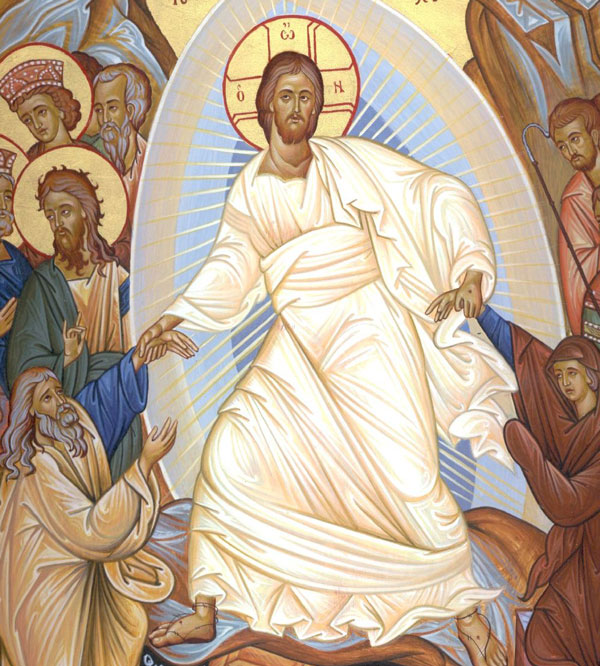
(Office of Readings, Second Reading for Holy Saturday)
Image Credit: Jim Forest/CC BY-NC-ND 2.0
